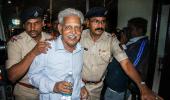'What is surprising is that the police press conference was based on letters (allegedly written by the activists).'
'Now those letters, according to the police, are yet to be verified by their (forensic) laboratory.'
'So, even the police is not sure that those letters are genuine.'

'How can the police do this? The matter is sub-judice,' asked the Bombay high court on Monday, September 3, raising questions over the Maharashtra police's media briefing on its case against five prominent activists arrested for their alleged links with Maoists.
Mihir Desai, senior advocate and co-founder of the Indian People's Tribunal and the Human Rights Law Network, agrees and questions the police's action.
Known to fight cases for the downtrodden and weak, Desai has often taken on the high and mighty in the establishment to safeguard human rights as defined by the Constitution.
It was Desai who fought the case for the family of 2002 Ghatkopar blast accused Khwaja Yunus who was allegedly killed in police custody.
In 2012, the Bombay high court directed the Maharashtra government to pay Rs 20 lakhs (Rs 2 million) as compensation to Khwaja's family.
"The police are keen to give evidence to the media than to the courts," Desai tells Rediff.com's Syed Firdaus Ashraf.
What do you think of the Bombay high court's observation over the Maharashtra police's press conference?
The press conference by the police was completely wrong and the Bombay high court rightly rapped them for it.
In 2014, the Bombay high court had stated that these kinds of press conferences affect both the accused as well as the victim in terms of maligning them.
What is more surprising is that the press conference was based on certain letters (allegedly written by the activists).
Now those letters, according to the police, are yet to be verified by their (forensic) laboratory.
So, even the police is not sure that those letters are genuine.
According to us, those letters are not genuine.
But at least the police should be sure that the letters are genuine.
The police can confirm the authenticity of the letters once the laboratory says these are correct letters as these are handwritten letters and they have been found on a pen drive.
This is the police version.
Unless the laboratories verify, the police cannot show these letters (to the media).
Even if they are verified, the police cannot hold a press conference.
But more so, it is not verified by their own laboratory.
Is the police getting a 90-day extension for filing a chargesheet against five persons arrested in June for alleged Maoist links very unusual?
It is unusual, more so because there is no sanction.
In order for a court to take cognisance of the matter under the UAPA (Unlawful Activities Prevention Act), you need the sanction of the government.
Now, there is no sanction from the government. So, today it cannot be treated as a UAPA case.
Therefore, the extension of time, according to us, was wrong.
According to us, the Pune court has made a mistake in granting this sanction.
Why is the government's sanction necessary in such cases?
The police can file an FIR (first information report), but extension of a chargesheet can be allowed if it is a UAPA case.
An investigation can always start with the FIR.
Before the court takes cognisance, UAPA sanction is needed from the government.
That is not obtained as yet, and therefore this order is wrong.
Are you going to challenge this order?
There are too many things right now. But we might challenge this order.
Do you think after these arrests, other human rights activists will come under pressure?
The police will try to strangulate human rights activists illegally, but then human right activists are known to fight back.
We are not worried about that.
We will fight back Constitutionally, legally, politically and factually.
These activists have been accused of planning to assassinate Prime Minister Narendra Damodardas Modi.
The Supreme Court intervened to ensure that these five activists were kept under house arrest only.
Is it a case of judicial overreach?
Not at all.
The Supreme Court has powers under Article 142 to do complete justice, and that is what they are doing.
The Supreme Court, unlike various other courts, has the power to intervene wherever they feel injustice is being done.
This power is not based on some law, but they have Constitutional power, given to them by the Indian Constitution.
So, the Supreme Court is entitled to do it.
What happens to investigations and arrests in such cases in the future?
The police are keen to give evidence to the media than to the courts.
If the police arrests people on basis of flimsy reasons, then they ought to be on the back foot.
They should be on the back foot.
This assumption that the police always acts neutrally is something which I don't agree with.










